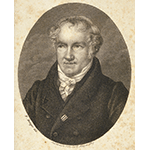Alexander von Humboldt
Born in Berlin of an illustrious Prussian family, Alexander von Humboldt was a tireless explorer. He was the younger brother of the statesman and intellectual Wilhelm von Humboldt. Alexander pursued studies in various disciplines, but his multiform theoretical preparation was functional to his desire to become an explorer. Very soon he attained his objectives. From June 5, 1799 to August 3, 1804 he undertook a long voyage of exploration that included the Canary Islands, the coasts of Venezuela, the banks of the Rio Amazon, the Andes, Peru, Cuba, Columbia, Ecuador, Mexico and the United States. Upon returning from this long voyage he settled in Paris, one of the major European capitals of culture and science. Between 1807 and 1833 he published in French a work in 34 volumes on his expedition to South America, accompanied by many maps in colour and illustrations. He also travelled in Europe and Asia through the Urals, the coasts of the Caspian Sea and Siberia. He devoted the last years of his life to his best-known work, Kosmos, Entwurf einer physischen Weltbeschreibung [The cosmos, project for a physical description of the world], published in five tomes between 1845 and 1862. The fifth volume was published posthumously. The work encountered extraordinary success and was translated into almost all of the European languages.
Last update 21/gen/2008




